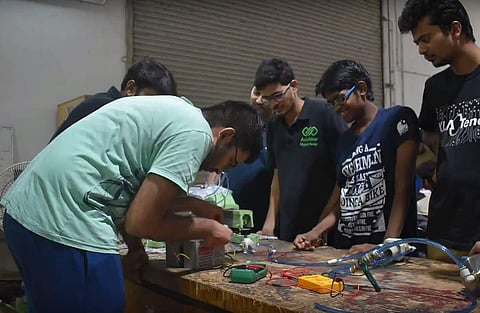

When Avishkar Hyperloop, the student team from IIT Madras that participated in the SpaceX Hyperloop Pod Competition heard about their qualification, they were overjoyed. When the full list of qualified teams came out, they couldn't believe their eyes. They were the only Asian team to qualify.
On Friday, they unveiled their Hyperloop Pod that has put them on the fast train to California for the finals and perhaps an opportunity to meet the man himself, Elon Musk. Musk, the Founder of SpaceX and Tesla, proposed the idea of the Hyperloop to the world in 2013 through a white paper – ‘Hyperloop Alpha.’ His company SpaceX organizes the Hyperloop Pod Competition to accelerate the development of functional prototypes and encourage student innovation. The team is among the top 21 out of 1600+ teams participating in the competition.
The Pod developed by Team Avishkaar spans about three metres in length and weighs around 120 kg. The team started the design by brainstorming on how the pod would be built, beginning with vehicle kinematics and dynamics, motors, power system and braking, stability, and finally designing the CFRP chassis and structures.
For the tech/science illiterates like me who don't really understand the concept of a Hyperloop, Pranit Mehta, one of the members of the team explains, "Why do you think an aeroplane is so much faster than a train or a car? Because it is flying in less air pressure. So with the Hyperloop, we are creating a tube with low pressure, a tube that is near-vacuum. Inside this tube, a high-speed train will travel at the speed of 1000-1200 kms per hour. The Hyperloop is the fifth mode of transport."
Speaking about the competition, Suyash Singh, Student Team Head, Avishkar Hyperloop, said, “The primary factor to decide the winner is the top speed achieved by the Hyperloop Pod in the run in the 1-mile long vacuum tube, installed at the SpaceX headquarters. But, to qualify to the top few teams to be allowed to run through the tube, the design has to go through a lot of checks and scrutiny based on its feasibility, manufacturing possibility and its safety aspects.”
The team is working with a vision to develop technologies for a future mode of high-speed transportation with applications in various fields including Defence, Logistics and Aerospace Industry, among others.
However, the journey hasn't been easy for the team, they had a lot of hurdles to overcome. Pranit told us about it, "We barely had any resources because hyperloop is an extremely new idea so there is very little research and development in that area. So we could not really find too many resources that were helpful." The other things were more real-world problems, "The second point is that all of us are individuals and so it was important that we were all compatible and we had to be completely synchronised in our work. The third major hurdle we had was that there was no way that we could test our product so we had to manufacture our own testing set-up, which was a one of its kind," he explained.
Speaking about the significance of this achievement, S R Chakravarthy, faculty advisor, Avishkar Hyperloop and professor, Department of Aerospace Engineering, IIT Madras, said, “The team has taken strenuous technical efforts at every stage, and has been quite professional about executing the project. This is an important milestone for the future transportation technology in our country. "
The team has already been invited to present their work at various events — FISITA World Automotive Congress 2018 & CII Future Mobility Show, International Conference on Energy Storage (ESI) 2019 and Hyperloop technology for Defence purpose at Army Technology Seminar 2019.
Once they reach a level to commercialise the project which they think will take about five years, the team members are planning to set up a start-up and continue working on the Hyperloop.
DME transferred Madurai assistant professor facing sexual harassment complaint
Madurai HC gives relief to medical aspirant; directs NTA to revise his NEET communal rank
Meet this 21-year-old Coonoor artist who carved the alphabet letters A to Z on a 0.7mm lead
This Kovai mechanical engineer-turned-singer is teaching music to the city
